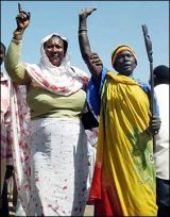Sudan makes headway in boosting women’s status: official
PUTRAJAYA, Malaysia, May 8, 2005 (Xinhua) — Sudan, mired in civil unrest for decades, is making headway in uplifting women’s status but the journey ahead is still long and arduous, a senior official said Sunday.

|
|
Sudanese women, one from the north (L) and one from the south hold hands as they chant ‘sawa, sawa’ (together) during celebrations in Khartoum, 01 January 2005. (AFP) . |
Director-General for Women and Family Affairs of Sudan Khadiga Abu Al-Ghassim Haj Hameed said since attaining independence in 1956, the government had drew up various development programs for women.
“But we moved more aggressively in the last 10 years, especially in bringing education and health facilities to wider areas,” she told reporters on the sidelines of the Senior Official Meeting (SOM) of the Non-Aligned Movement (NAM) Ministerial Meeting on the Advancement of Women here.
The two-day SOM ends Sunday ahead of the ministerial meeting scheduled for Monday and Tuesday.
Khadiga is heading a three-member delegation from Sudan for the meeting whose main task is to finalize the Putrajaya Declaration which will outline the blueprint for gender equality.
She said the main challenge facing the country was poverty eradication which had direct implications on women like the high mortality rate,averaging 509 in every 100,000 births.
“This figure is still very high compared to other countries which are advanced in their healthcare services.”
“This is because the number of doctors and qualified midwives is still inadequate, with one doctor to 8,000 people in rural areas,” she said.
In urban areas, she said, the ratio was also not that good, with only one doctor serving 1,000 people.
Another daunting task of the nation was the AIDS and HIV menace, with a very high number of sufferers, she said.
Without giving figures, she said a five-year National Strategy for Combating AIDS had been drawn up for between 2003 and 2007.
Sudan, the biggest African nation which signed a peace pact recently with the rebel Sudan People’s Liberation Movement, ending more than two decades of civil war in the south, had also made considerable progress on women participation in government services.
Khadiga said there were three women ministers, including one in the crucial Finance Ministry in the cabinet of President Omer Hassan Ahmad Al-Bashir.
About 10 percent of the members of the National Parliament are women,with 25 percent women representatives in the ruling National Congress Party.
She said the judiciary also had good women representation with eight senior women judges.
Sudan, a north African nation of 34 million people, has been accused by western countries and international media of perpetuating injustices against women.
